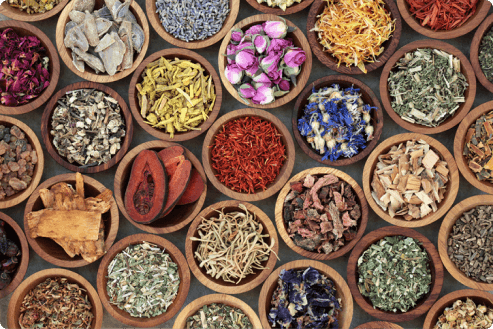Peritoneal mesothelioma survivor Ruth Phillips takes several vitamins, antioxidants and herbs. She undergoes regular checkups to monitor the effects of the supplements she takes. “This is kind of like a full-time job, just staying alive. Take this stuff, that stuff, do this, do that. It really never ends. But that’s how it is when you’re trying to cohabitate with cancer.”
Herbal Medicine for Mesothelioma
Herbal remedies, supplements and relaxation practices can improve quality of life during standard care. They aren’t a cure, and you should talk with your doctor before trying any of these options.

Types of Herbs & Natural Treatments for Mesothelioma
Natural treatments for mesothelioma include herbal medicines, supplements, diet and relaxation techniques. Herbal medicine for mesothelioma includes ginger, turmeric and others. Dietary supplements like B12 can help people through mesothelioma chemotherapy. Meditation and other relaxation techniques can reduce stress and negative feelings.
People have reported that these types of natural treatment options for mesothelioma have helped them cope with symptoms and treatment side effects. Research shows they can’t replace conventional cancer treatment. No natural treatment has been proven to control or cure mesothelioma. The importance of discussing herbs and natural treatments with your mesothelioma doctor before buying or trying them can’t be stressed enough.
In our exclusive 2025 mesothelioma survivor survey, 46% of respondents had used a variety of types of natural treatments. They’d tried approaches such as medical marijuana, herbal medicine, meditation, and TENS, which is also known as transcutaneous electrical nerve stimulation.
Herbal Medicines
Herbal medicine may lessen your mesothelioma symptoms and the side effects of treatment. The herbs most studied in cancer care include astragalus and dong quai. Much of the research has tested them with chemotherapy.
Research on astragalus shows it may reduce the side effects of cisplatin and carboplatin. These are 2 of the most effective chemo drugs for mesothelioma. Dong quai may help protect the heart from damage the chemo drug doxorubicin can cause.
Avoid any herbal remedy promoted as a cure for cancer. For example, research shows essiac tea doesn’t cure cancer. But it does contain more antioxidants than red wine or green tea. Also, a common misconception is that natural products can’t be harmful or that they’re always safe to combine with pharmaceutical medications. Speak to your doctor before using any herbal medicines.
Diet and Supplements
Mesothelioma diet and supplements may boost your immune system and aid recovery. For example, eating more protein can help repair damaged tissue. Folic acid and B12 supplements can reduce the side effects of chemo.
Diet and supplements can’t control mesothelioma, but future research may improve treatment outcomes. For instance, a compound in St. John’s Wort may help kill cancer cells. It makes certain cancer cells more likely to die after photodynamic therapy, an experimental treatment for mesothelioma.
Because of the potential interactions, talk to your doctor before taking a supplement. St. John’s Wort, for example, is known to interfere with the effectiveness of some chemo and immunotherapy drugs. Your doctor can advise if it’s safe to take supplements and which ones might be helpful for you. They can also warn you about potential drug interactions.
Relaxation Techniques
Relaxation techniques for mesothelioma include meditation, yoga, Qigong and Tai Chi. These techniques may ease symptoms and stress. They may help you relax, reduce anxiety and improve overall health.
Meditation can improve sleep, mood and fatigue. Yoga may aid sleep and reduce stress. Qigong and Tai Chi are gentle and effective for fatigue and inflammation.
People with mesothelioma should try gentle techniques. Speak to your doctor about safe complementary therapies that don’t cause strain or put stress on the body.
How Do Natural Treatments Work for Mesothelioma?
Natural treatment options for mesothelioma may boost the immune system. Some soothe the digestive system. Medical marijuana can calm the nervous system to improve nerve pain.
Studies in test tubes and animals suggest some natural treatments may help fight cancer. But researchers haven’t replicated these results in human trials.
Cancer doctors rely on clinical trials to recommend treatments. Few human trials on natural treatments for mesothelioma have made it hard for doctors to suggest them safely. Always talk to your doctor before trying a natural treatment. Some natural remedies may impact the outcome of your treatment.

Discover how mesothelioma doctors personalize treatment plans for you.
Sign up nowNatural Treatment Options for Mesothelioma Side Effects
Natural treatment options may help you manage your mesothelioma symptoms and treatment side effects. For example, research in humans shows mistletoe reduces chemo side effects in lung cancer patients. It helps people tolerate higher doses of Gemzar (gemcitabine), a chemo drug used to treat mesothelioma.
Turmeric contains a compound known as curcumin. Research indicates it may be safe to combine with Gemzar. It may also reduce bruising after surgery. Aloe vera taken during chemo helped prevent mouth sores in studies.
| Side Effect or Symptom | Herbal Medicines |
|---|---|
| Anxiety or stress | kava, passionflower, magnolia bark |
| Appetite loss | medical marijuana, dandelion, devil’s claw, lemon balm, siberian ginseng |
| Constipation | aloe vera, fenugreek, ragweed, senna, psyllium |
| Coughing | black cohosh, slippery elm bark, white/western yarrow |
| Depression | St. John’s Wort, valerian |
| Diarrhea | bilberry, blackberry leaf, chamomile, huanglian, marshmallow root |
| Fatigue | |
| Nausea or vomiting | ginger, medical marijuana, grape seed, peppermint, Roman chamomile |
| Pain | medical marijuana, boswellia, curcumin/turmeric, white willow bark, arnica |
| Shortness of breath | hawthorn, eucalyptus, lobelia, white pine bark |
| Sleeplessness or insomnia | passionflower, valerian, chamomile |
| Skin irritation | calendula, holy basil, milk thistle, panax ginseng |
Doctors don’t recommend taking herbal medicine during cancer treatment. If you want to try herbal medicine during treatment, talk to your doctor first. If your doctor approves its use, they can monitor your response and warn you of potential drug interactions. Some of these herbs might be safe to take after you stop treatment.
Tejal Parekh, a registered and licensed dietitian, shares with us, “I tell my patients to check with their physician before starting any new medication. This is to make sure that one treatment (particularly Chinese herbs) doesn’t interfere with another. While Chinese medicine continues to be researched, certain therapies such as acupuncture and acupressure could provide benefits in managing the myriad side effects that can occur with treatment such as chemotherapy.”
Are Herbs and Natural Treatments Safe and Effective for Mesothelioma?
Herbal and natural treatments for mesothelioma are usually safe. The effects of herbs can range from mild to potent depending on the person taking them and the medications they’re using. And they may not work as well as conventional treatments. Research has shown a mix of benefits and risks for people with cancer.
Integrative oncology combines natural and conventional cancer treatments. It looks for safe and effective combinations. Most research on natural treatments has been conducted in test tube or mouse studies. Research on humans has been done in other countries.
Key Facts About Risks and Benefits for Mesothelioma
- Curcumin: Curcumin is a natural substance found in turmeric, a spice. In lab tests with mesothelioma cells, it showed some ability to stop cancer cells from growing. But the study didn’t test it on people or animals, so there is no evidence yet that it prevents mesothelioma.
- Quercetin: Quercetin is a natural compound in foods like apples and onions. Research is promising in lab tests. But there’s no data from tests on people or animals to show if it prevents mesothelioma.
- Selenium: Selenium is a natural mineral found in certain foods. In lab tests, it stopped mesothelioma cells from growing and made them die off. Research on animals and people hasn’t happened yet.
- Vitamins: Researchers gave people vitamin A and beta-carotene to see if they would help. But these vitamins didn’t prevent mesothelioma. Even worse, they made some people more likely to get lung cancer or heart disease.
Some herbs can cause bleeding during surgery. Some block the body’s removal of cancer drugs. Interactions with mesothelioma medications can happen. Always talk to your oncologist before buying or trying natural remedies. They want to keep you safe from harmful interactions. Your doctor may approve its use after you complete treatment.
Pleural mesothelioma survivor Billy K. tells us he’s tried herbal medicine. “I just figured I had nothing to lose, so why not try something like this. I feel great, so you could say I’m a believer now,” Billy says. “People say I look better now than before I got sick. I’m sure this moringa had something to do with it.”

Get a free guide with the latest mesothelioma treatments and clinical trials.
Get Yours NowCommonly Asked Questions About Herbal Medicine
- Can herbal medicine cause side effects?
-
Herbal medicines may be less likely to cause side effects than traditional drugs. But patients can still experience complications. Certain herbs may interact with chemo drugs. Some may stop blood from clotting well after surgery. Pay attention to how you feel before and after using herbal remedies. Talk to your doctor before using herbs. This helps avoid problems.
- Is herbal medicine regulated in the United States?
-
Dietary supplements don’t need FDA testing before they hit the market. Some have contained arsenic, lead or mercury. Stay away from herbal medicines that claim to cure cancer. These remedies are often made without scientific proof to back manufacturers’ claims.
- How can I find safe herbal supplements?
-
If your doctor gives you the ok to try herbal supplements, you can ask for their recommendation for safe options. Buying them from trusted companies can help ensure their safety. Look for the United States Pharmacopeia label on products. Quality labels on herbal supplements show specific acronyms. GLP stands for Good Laboratory Practice. GMP stands for Good Manufacturing Practice.
- Do clinical trials investigate herbs for people with cancer?
-
You can ask Patient Advocates and your doctor about trials testing herbs with mesothelioma treatment. These trials are rare. But they watch patients for harmful interactions. They take steps to avoid unwanted side effects. They test herbs for contaminants before giving them.



